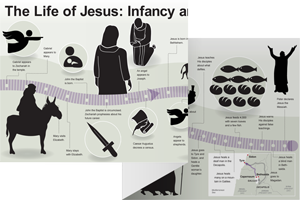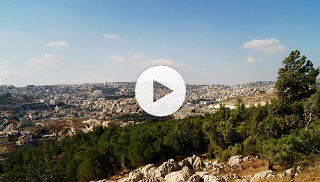1:1–4 The Gospel of Luke, |
1:1 many have attempted Indicates that Luke is familiar with other sources that discuss Jesus.
an account Refers to an orderly or systematic description of events or words.
1:2 eyewitnesses Those who heard Jesus’ preaching and saw His attesting signs firsthand.
from the beginning Refers to the start of Jesus’ ministry.
1:3 Theophilus This Greek name means “friend of God.” It might refer to a specific individual, or Luke could have been writing to the church at large—to all who consider themselves friends of God. Theophilus might have been Luke’s patron, a wealthy person responsible for funding the writing, copying, and distribution of Luke’s Gospel and the book of Acts (see Acts 1:1).
1:4 the things about which you were taught Luke likely is referring to teaching about Jesus’ ministry, death, and resurrection.
1:5–25 This section marks the beginning of the birth narratives in Luke’s Gospel (continuing through Luke 2). Unlike Matthew, who records only Jesus’ birth, Luke includes the announcement and birth of John the Baptist. |
1:5 in the days of Herod, king of Judea Herod the Great ruled 37–4 bc. See note on Matt 2:1.
Zechariah Means “Yahweh has remembered,” which is fitting for the circumstances of the narrative.
division of Abijah Zechariah belonged to the eighth priestly division, according to King David’s arrangement (1 Chr 24:1–10).
from the daughters of Aaron Indicates that Elizabeth (as well as Zechariah) came from the priestly class.
1:6 commandments and regulations of the Lord Refers to the law.
1:7 Elizabeth was barren Barrenness was common among the prominent women of the ot (see 1 Sam 1:2 and note). By identifying Elizabeth with these women, Luke hints that God will provide her with a son.
they were both advanced in years Like Abraham and Sarah (Gen 17:17).
1:8 in the order of his division Each division of priests served in the temple twice annually, with each session lasting one week.
1:9 to burn incense A rare honor normally received once during a priest’s lifetime.
1:10 were praying The Greek verb used here, proseuchomai, occurs more frequently in Luke and Acts than in Matthew or Mark. Luke emphasizes prayer more than the other Synoptic Gospels.
1:11 an angel of the Lord Identified later as Gabriel (see note on Luke 1:19).
 Angels in the Bible Table
Angels in the Bible Table
1:13 do not be afraid A common heavenly greeting and message of reassurance found throughout the Bible (e.g., vv. 30; 2:10; Judg 6:23; Dan 10:12; Rev 1:17).
John Means “Yahweh has shown favor,” which aligns with John’s vocation.
1:15 never drink wine or beer Like Samson and Samuel, John the Baptist was to be a Nazirite from birth (see Num 6:1–4; Judg 13:2–5; 1 Sam 1:11).
was to be a Nazirite from birth (see Num 6:1–4; Judg 13:2–5; 1 Sam 1:11).
1:17 to turn the hearts Gabriel alludes to Mal 4:5–6 to compare John the Baptist with the ot prophet Elijah. Jesus refers to John as a type of Elijah in Matt 11:14 (see note on Matt 16:14).
Jesus refers to John as a type of Elijah in Matt 11:14 (see note on Matt 16:14).
to prepare for the Lord Possibly an allusion to Mal 3:1, which Jesus quotes explicitly to refer to John the Baptist (Luke 7:27).
1:18 an old man, and my wife is advanced Recalls Abraham’s disbelief (see v. 7 and note).
1:19 Gabriel One of only two named angels in the Bible (the other is Michael, mentioned in Dan 12:1; Rev 12:7). Gabriel also appears to Daniel and explains his vision (Dan 8:15–26).
also appears to Daniel and explains his vision (Dan 8:15–26).
 Angels in the Bible Table
Angels in the Bible Table
1:20 you will be silent This is the sign Zechariah asked for in Luke 1:18. He regains his speech after confirming John’s name (vv. 63–64).
1:21 the people were waiting for Zechariah Refers to the crowd that was praying (v. 10).
1:22 not able to speak to them It was customary for a priest to pronounce a blessing after coming out of the temple.
1:23 days of his service Refers to the one-week period (see v. 8 and note).
1:25 my disgrace Elizabeth declares that God has taken away her barrenness (v. 7).
1:26–38 After describing the announcement of John’s birth, Luke reports Gabriel’s announcement to Mary about Jesus. |
1:26 in the sixth month Occurs six months after Elizabeth conceived (v. 24).
a town of Galilee named Nazareth A small agricultural village to the southwest of the Sea of Galilee. Nazareth has been inhabited continuously since the third century bc.
has been inhabited continuously since the third century bc.
1:27 a virgin Luke calls Mary a virgin twice in this verse to demonstrate that Jesus’ conception was an act of God (see vv. 34–35; Matt 1:23 and note).
twice in this verse to demonstrate that Jesus’ conception was an act of God (see vv. 34–35; Matt 1:23 and note).
 The Virgin Shall Conceive: The Vocabulary of Virginity
The Virgin Shall Conceive: The Vocabulary of Virginity
legally promised in marriage At this time, betrothal represented a permanent relationship nearly equivalent to marriage; breaking off a betrothal required a decision akin to divorce.
breaking off a betrothal required a decision akin to divorce.
of the house of David Luke alludes to Isa 11:1–2 to portray Jesus as the shoot and branch of Jesse (compare Luke 1:32 and note). This portrays Jesus as the Messiah, from King David’s line. (David was Jesse’s son.)
1:28 The Lord is with you Recalls “Immanuel” (“God with us”) from Isa 7:14, which was already alluded to in Luke 1:27 (compare Matt 1:23).
(“God with us”) from Isa 7:14, which was already alluded to in Luke 1:27 (compare Matt 1:23).
1:30 Do not be afraid See Luke 1:13 and note.
1:31 Jesus From the Hebrew name Joshua, which means “Yahweh is help (or, salvation)” (see Matt 1:21).
1:32 Son of the Most High Highlights Jesus’ divinity and royalty (compare Luke 1:35, 76).
give him the throne of his father David Gabriel implies that Jesus will fulfill the Davidic covenant (2 Sam 7:12–13).
1:33 the house of Jacob A common ot phrase referring to Israel (e.g., Exod 19:3; Isa 48:1).
his kingdom there will be no end Gabriel again alludes to the Davidic covenant (compare note on Luke 1:32), but this allusion also evokes messianic imagery from Daniel (see Dan 7:13 and note; 7:14 and note).
1:34 I have not had sexual relations with See Luke 1:27 and note.
1:35 Son of God This title reflects Jesus’ miraculous conception and, consequently, His divinity (see note on v. 27).
1:36 in her old age See vv. 7, 18.
sixth month See v. 26 and note.
who was called barren See v. 7.
1:38 the Lord’s female slave Mary indicates that she is willing to do whatever God requires of her.
1:39–45 Mary visits Elizabeth to assist her in the final months of her pregnancy. Given the immense social pressures and stigma that Mary was about to endure as an unwed mother, she likely sought solace in Elizabeth, who would believe the divine nature of her conception. |
1:41 the baby in her womb leaped John leaps in Elizabeth’s womb at the sound of Mary’s voice because Mary is pregnant with Jesus.
Elizabeth was filled with the Holy Spirit Compare v. 15.
1:42 Blessed are you among women Mary is blessed because she has the privilege of giving birth to the Messiah, the savior of the world.
1:43 my Lord Elizabeth calls the unborn Jesus her Lord, recognizing Him as Messiah and perhaps also as Yahweh.
1:45 blessed is she who believed In contrast to Zechariah, Mary believed Gabriel’s words (compare v. 20).
1:46–56 Known as the Magnificat, Mary’s song marks the first of four hymns in Luke’s birth narratives. It is styled after Hannah’s song of praise in 1 Sam 2:1–10. |
1:46 My soul exalts the Lord Mary’s introduction reflects Hannah’s in 1 Sam 2:1.
1:48 the humble state of his female slave Mary highlights her modest condition in a similar fashion to Hannah in 1 Sam 2:8 (compare 1 Sam 1:11). The theme of God’s care for the lowly is highlighted throughout Luke’s Gospel.
all generations will consider me blessed See Luke 1:42 and note.
1:49 the Mighty One Like Hannah, Mary praises God’s attributes by using names that reflect His character (compare 1 Sam 2:2).
1:51 proud in the thoughts of their hearts Both Mary and Hannah renounce the arrogance of the proud who make themselves enemies of God (see 1 Sam 2:3; compare Prov 3:34; Isa 2:12; 13:11).
1:52 and has exalted the lowly Both Mary’s and Hannah’s songs describe a reversal of fortunes: The lowly are exalted, while the exalted (or haughty) are brought low (see 1 Sam 2:4, 7–8; compare Job 5:11).
1:53 those who are hungry with good things Expresses God’s gracious provision for the lowly (compare Psa 107:9). In 1 Sam 2:5, a similar phrase expresses Hannah’s newfound joy associated with the birth of Samuel.
1:55 to Abraham and to his descendants In fulfillment of Yahweh’s proclamation to Abraham, Mary’s son was to be a channel of blessing and salvation to the nation of Israel (Gen 12:1–3; 17:1–27).
1:56 about three months Mary stays until roughly the time of John’s birth (compare Luke 1:26, 36).
1:57–66 As Gabriel had predicted (v. 13), Zechariah and Elizabeth receive a son from God. While deciding the child’s name, Zechariah writes the name John on a tablet and regains his ability to speak. Consequently, all who hear of this event wonder about the child’s future, thereby igniting messianic hopes in that region (compare 3:15). |
1:57 she gave birth to a son Fulfills the proclamation of v. 13.
1:59 on the eighth day As prescribed by Yahweh and the law (Gen 17:12; Lev 12:3).
1:60 he will be named John Demonstrates Elizabeth’s faith in Gabriel’s message (Luke 1:13).
1:62 asking what he wanted him to be named In ancient Israel, fathers held the final naming rights.
1:64 his mouth and his tongue were opened immediately Fulfills Gabriel’s words in v. 20.
1:66 What then will this child be Hints at messianic expectation (see note on Matt 1:1).
1:67–80 In the second of the four hymns in Luke’s birth narratives, Zechariah praises God for His great redemption, provision, and blessing. This song is known as the Benedictus due to its first word in the Latin Vulgate (an ancient Latin translation of the Bible; compare note on Luke 1:46–56). |
1:67 was filled with the Holy Spirit Compare vv. 15, 41.
1:69 a horn of salvation A metaphor for power (e.g., 2 Sam 22:3; Pss 18:2; 148:14).
1:73 to Abraham our father Yahweh’s covenant with Abraham is recorded in Gen 17:1–27.
1:76 the prophet of the Most High Refers to John the Baptist.
 Jesus and His Witnesses as Prophets in Luke—Acts
Jesus and His Witnesses as Prophets in Luke—Acts
before the Lord to prepare his ways Compare Luke 3:4.
1:77 by the forgiveness of their sins Compare 3:3.
1:79 sit in darkness Perhaps an allusion to Isa 9:2 (compare Matt 4:16).
1:80 the child kept growing This verse summarizes approximately 30 years (compare Luke 3:23).
in the wilderness This detail sets up the quotation of Isaiah’s prophecy in 3:4–6 (compare Isa 40:3 and note). It also might be intended to evoke Israel’s wilderness wanderings after the exodus. See note on Luke 4:1.

|
About Faithlife Study BibleFaithlife Study Bible (FSB) is your guide to the ancient world of the Old and New Testaments, with study notes and articles that draw from a wide range of academic research. FSB helps you learn how to think about interpretation methods and issues so that you can gain a deeper understanding of the text. |
| Copyright |
Copyright 2012 Logos Bible Software. |
| Support Info | fsb |
 Loading…
Loading…




